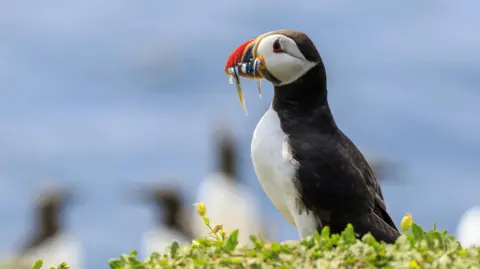Sandeel fishing ban a lifeline to seabirds - RSPB
- Sandeel numbers are said to be under pressure from North Sea fishing
- Britain's seabirds, as well some fish species and sea mammals, feed on the eel-like fish
- The government is considering a ban on industrial sandeel fishing
- The National Federation of Fishing Organisations say sandeels are not a target species of UK vessels
 Getty Images
Getty ImagesA ban on sandeel fishing could help boost Britain's seabird numbers, conservationists have said.
The RSPB said stopping industrial trawling for the small eel-like fish in the North Sea would "throw our most threatened seabirds a lifeline in the face of mounting pressures".
Sandeels are a vital food source for seabirds as well as some fish species and sea mammals, such as seals and whales, but are "under pressure" from fishing, the charity said.
The government has launched a three-month consultation on the issue, though the National Federation of Fishing Organisations (NFFO) said that, with sandeels not being a target species for UK vessels, it did not expect opposition to the proposal.
The proposal comes ahead of a new BBC wildlife documentary, Wild Isles, presented by Sir David Attenborough, that will explore how habitats support wildlife around the UK, including the importance of sandeels for puffins.
The plan has been warmly welcomed by RSPB Bempton Cliffs in East Yorkshire, where about half a million seabirds gather each year to raise their offspring on towering chalk cliffs.
Site manager Dave O'Hara told the BBC: "It's really heartening, and the RSPB is really pleased to see the move towards a closure of sandeel fishing.
"The kittiwakes here have declined quite a lot. Productivity has been low and that is linked to sandeel availability."
According to experts at Natural England, the Joint Nature Conservation Committee and Centre for Environment, Fisheries and Aquaculture Science, seabird abundance could increase within 10 years as a result of the full banning of industrial sandeel fishing in UK waters.
Katie-jo Luxton, director for conservation at the RSPB, said it was "a crucial moment" for the UK's efforts to save its iconic seabirds.
She added: "Decades of increasing ‘human-induced’ pressures in our busy seas have left our seabirds in a precarious state, and a ban on industrial trawling for sandeels would throw our most threatened seabirds a lifeline in the face of mounting pressures in our seas."
Citing concerns over the impact of last year's outbreak of highly contagious avian flu, Ms Luxton said there was an "urgent need to build the resilience of our seabird colonies".
Environment Secretary Thérèse Coffey said the consultation was an "important step" in protecting seabirds and delivering the government's Environment Improvement Plan aimed at allowing wildlife to thrive.
She added: "Britain’s seabirds are beautiful to observe and a treasured part of our coastal environment and their existence and ways of life are crucial to the wider health of our marine ecosystems."
NFFO chief executive Barry Deas said sandeels are not targeted by UK vessels.
"They're mainly targeted by the Danes," he said. "I do not think there will be many voices raised here in opposition."
Follow BBC East Yorkshire and Lincolnshire on Facebook, Twitter, and Instagram. Send your story ideas to [email protected].
